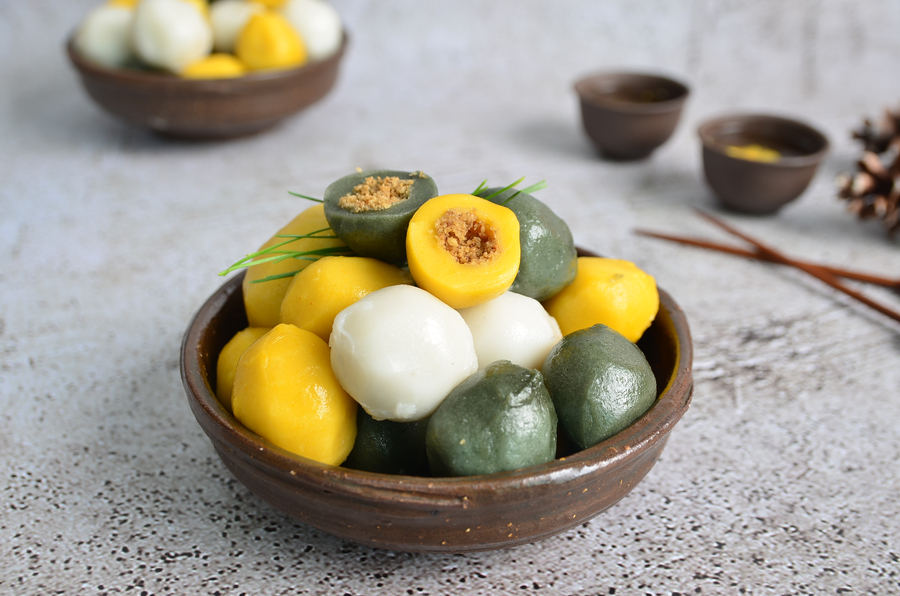Webzine
The Most Delicious Solidarity: Saving the Land and Farmers
2025.10.17Ⅱ Exploring Nenia’s Production Sites Ⅱ
Meeting Hongseong Pulmu on the Path of Eco-Friendly Agriculture
Preparing a home-cooked breakfast from early in the morning can be cumbersome. I have tried eating salad and bread, but even that is sometimes difficult to prepare during the rush of a busy morning commute. One day, in the midst of such a hectic daily routine, I encountered Nenia’s rice cakes made by Hongseong Pulmu.
They were individually wrapped and frozen. If I took them out while getting ready for work, they would thaw in about 30 minutes. As I stepped out of the house, they would be cool and soft—perfect to eat on the go. There was no need for cooking or sitting down to eat, and since they were made from rice, they were quite filling. Surprisingly, the texture and taste were even better than freshly made rice cakes. “This needs to be shared widely!” I thought, and quickly arranged an interview with the rice cake manufacturer.
In earlier times, when rice was not abundant, rice cakes were never left uneaten. However, in an age of plenty, rice cakes left over after events are often stored in the freezer. When thawed again, their moisture, flavor, and fresh taste are usually diminished compared to when they were first made at the mill.
Hongseong Pulmu, however, developed and released a product designed from the outset to be frozen, creating rice cakes that become as fresh as if they were just made after thawing—sometimes even tastier than when they were first produced. But that is not the only special thing. When you hear Hongseong Pulmu’s story, their rice cakes become even more meaningful.
On the road to Hongdong
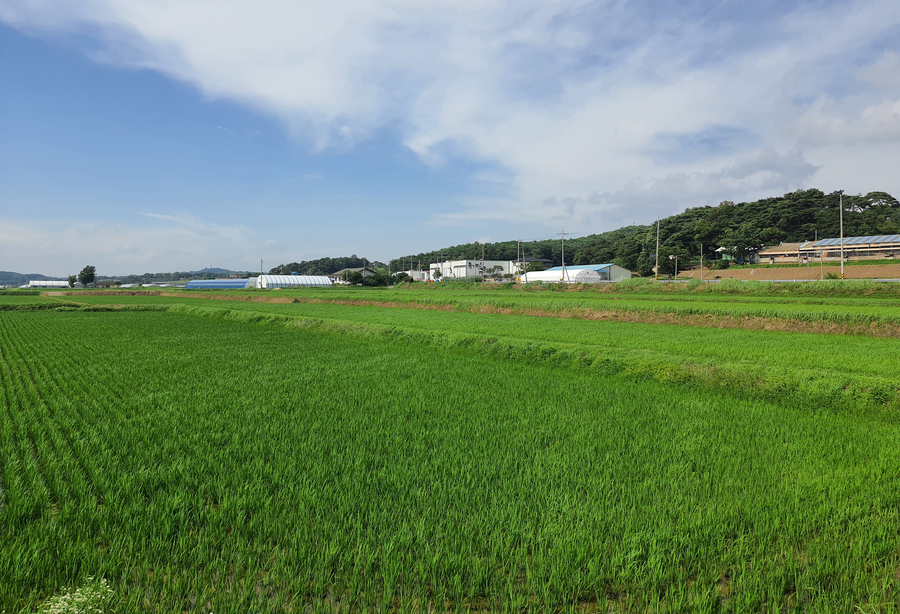
△ Around the headquarters of Hongseong Pulmu Co., Ltd., located in Hongdong-myeon, Hongseong-gun, Chungcheongnam-do, eco-friendly rice fields stretch out in every direction. (Photo: Hongseong Pulmu)
Low, gentle mountains surround the area. Water ripples through the newly planted rice paddies, reflecting the silhouettes of trees like a decalcomania print. Just beyond the edge of the paddy fields, separated by a single road, a sign reads “Yugi Bang-a” (Organic Mill). This is the long-standing brand name of Hongseong Pulmu, an agricultural corporation.
As I approached the main gate of Hongseong Pulmu, the warm, fragrant smell of rice cakes filled the air. Executive Director Kim Byung-hyuk greeted me with a friendly smile. Kim has long served as a key figure in the eco-friendly agriculture sector, holding positions such as Secretary General of the Chungnam Association of Eco-friendly Farmers and Policy Committee Chair of the Korea Eco-friendly Agriculture Association.
There is a memorable story connected to Kim. In 2020, during the COVID-19 pandemic, the suspension of school meal programs placed a severe burden on farms and regional corporations that supplied eco-friendly agricultural products to schools. Although school meal budgets were allocated, they could not be used. It is easy to talk about it now, but at the time, many farmers and companies were in genuine crisis. For reference, Hongseong Pulmu’s sales fell by approximately 25 percent during the pandemic. Unable to ignore the hardship faced by eco-friendly farmers and companies, Kim (then Policy Committee Chair of the Korea Eco-friendly Agriculture Association) and several others proposed a new idea to the government. They suggested using the unspent school meal budget to deliver eco-friendly agricultural products originally intended for schools directly to students’ homes. The proposal was submitted to the Ministry of Agriculture, Food and Rural Affairs, and the Minister of Education also agreed.
As a result, the “Eco-friendly Home Package” project was launched, delivering eco-friendly food packages to households with students. Thanks to this initiative, eco-friendly farms and regional corporations that were on the brink of bankruptcy were able to survive. In the midst of this effort stood Kim Byung-hyuk. As Policy Committee Chair, he played a key role in making this happen. Now, standing at Hongseong Pulmu, one cannot help but wonder: what kind of future does Kim envision here.
Meeting a “True” Eco-Friendly Farmer
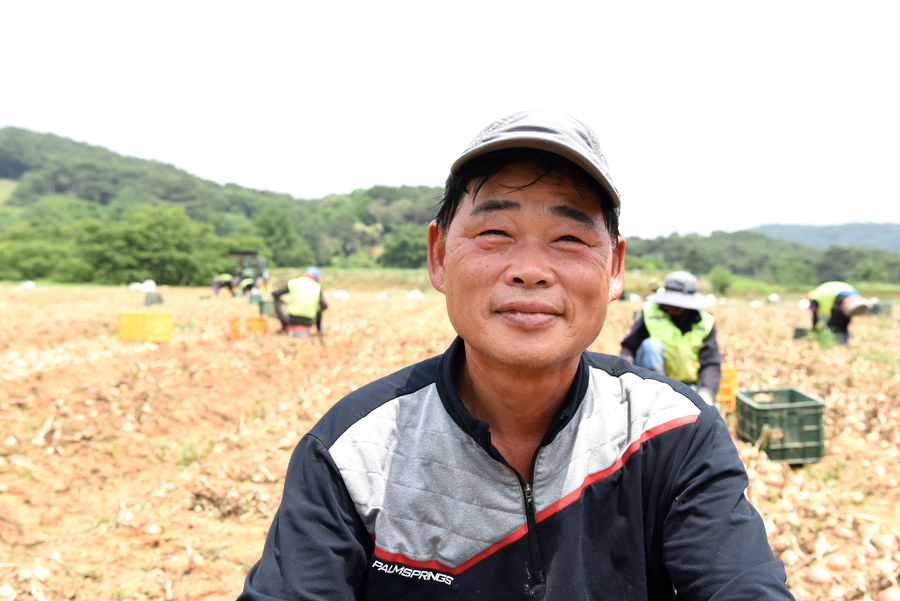
Before beginning their in-depth conversation with Executive Director Kim Byung-hyuk, the Nenia Webzine editorial team visited the onion field of Hongseong Pulmu’s CEO, Park Jong-kwon. Sweat poured continuously down Park’s forehead. Under the blazing sun, his face was as red as the skin of an onion. The field, which appeared to stretch well over 2,000 pyeong, was filled with blackened onion sprouts and undersized bulbs.
Park explained that the onions had been struck by pests and disease. Spraying 100,000 won worth of conventional pesticide would have solved the problem easily, but he could not use it. Instead, he applied 7 million won worth of eco-friendly pest control products. Even so, the onions did not grow to full size. He was working in the field, preparing to harvest part of the crop and plow under the rest.
“There are times in life when you want to give up,” Park said. “But you cannot win against nature by fighting it. If you do not have a philosophy, you cannot farm this way.”
That is indeed the case. Without depth, it is easy for agriculture to drift toward a model focused solely on money and productivity. However, Park explained that from a young age he was taught that chemicals should not be used on food meant for people. He is a graduate of Pulmu School, the cradle of eco-friendly agriculture and alternative education in Korea.
It was striking to realize that the head of Hongseong Pulmu is himself a farmer. Leaving the onion field, where the results did not reflect the effort invested, we walked with heavy steps. Executive Director Kim Byung-hyuk and Mr. Kim Young-gyu (former Director of the Chungnam Eco-friendly Agriculture Distribution Support Center) then guided us through the Hongdong area, explaining the history of eco-friendly agriculture and local movements. The rice cakes produced by Hongseong Pulmu are, in essence, an extension of the region’s eco-friendly agricultural practices—a direct manifestation of their philosophy in tangible form.
The Birthplace of Eco-Friendly Agriculture: Pulmu School
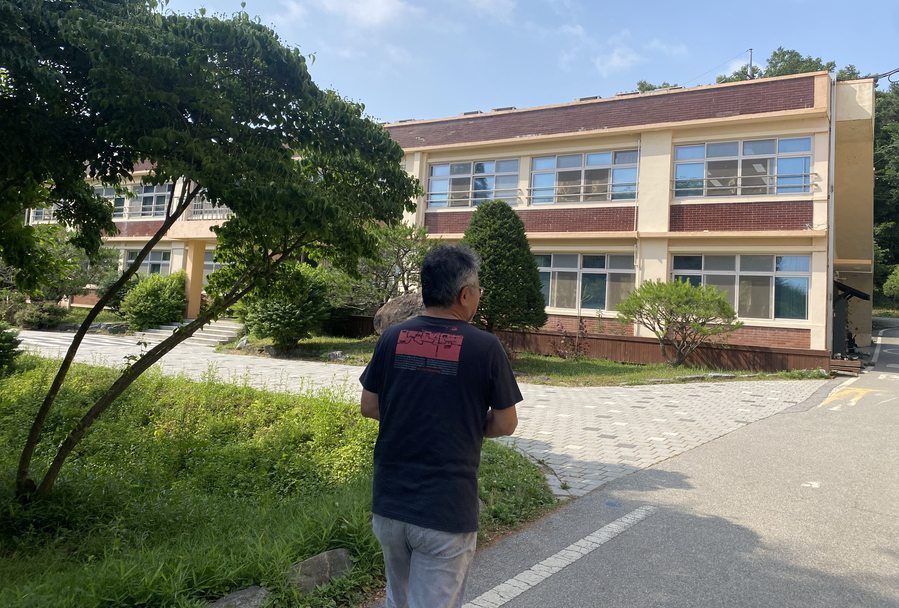
△ Mr. Kim Young-gyu, who has worked for many years in eco-friendly agriculture organizations, introduces Pulmu School. (Photo: Nenia)
In 1958, Pulmu School began when a single old rice mill was purchased in Hongseong, Chungcheongnam-do, and turned into a Christian high-level civic school (equivalent to a middle school program). Later, in 1963, it reopened as Pulmu Agricultural High Technical School, one of the small independent schools then permitted. The school was founded by Lee Chan-gap (1904–1974) and Joo Ok-ro (1919–2001). Lee, originally from Jeongju in Pyeonganbuk-do, envisioned and practiced a community built around education and cooperatives. Joo, a native of Hongdong, was also deeply interested in educational cooperative movements. Together, they joined forces to establish a school dedicated to educating the children of farming families.
The motto of Pulmu Agricultural High Technical School (hereafter Pulmu School) is “Commoners Living Together.” Its educational philosophy is to cultivate “Great Commoners”, not elites or individuals oriented toward personal advancement. Now celebrating its 65th anniversary, Pulmu School maintains a “small school” model, limiting each grade to 25 students. It also offers a two-year specialized program, similar to a junior college, known as the “Major Department.” Here, students learn not only agriculture but also humanities, farm planning, agricultural science and technology, natural sciences, green philosophy, and alternative medicine.
It is impossible to explain eco-friendly agriculture in Hongdong-myeon, Hongseong-gun without mentioning Pulmu School. Pulmu School began practicing organic farming in 1975, following a visit from Junichi Kodani, the president of Japan’s Ainokai (Loving Farming Association). Many of the leading figures in Korea’s eco-friendly agriculture movement are graduates of Pulmu School. Park Jong-kwon, the CEO of Hongseong Pulmu, is a 17th class graduate of the school. Four of his classmates are currently farming in Hongdong-myeon, Hongseong-gun. The Pulmu Consumers’ Cooperative, the largest eco-friendly agricultural organization in the county, originated in 1960 as a student cooperative at Pulmu School. In a small township, the cooperative attracted nearly 1,000 members, an impressive number. The person who organized and led this movement was none other than Park Jong-kwon.
In 2014, Hongseong-gun was designated as the nation’s first “Special Organic Agriculture Zone,” a title befitting its reputation as both the birthplace and heartland of Korean organic farming. This achievement would not have been possible without the dedication of Pulmu School and its graduates, as well as their strong philosophy of organic agriculture.
Establishing the Hongseong Pulmu Rice Cake Factory
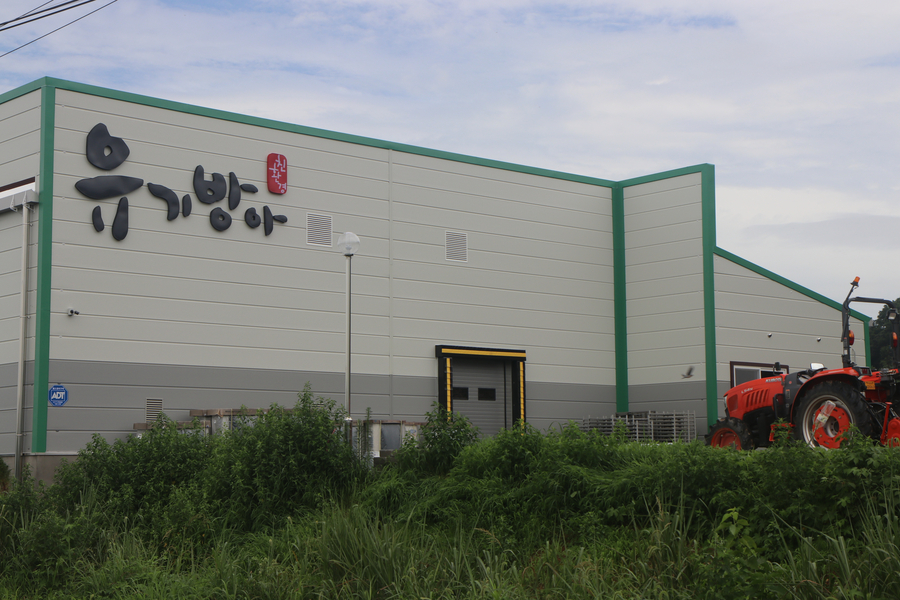
△ 'Yugi Bang-a' is the brand name of Hongseong Pulmu Co., Ltd. The company is located next to eco-friendly rice paddies in Hongdong-myeon. (Photo: Nenia)
In the early to mid-2000s, a crisis struck the eco-friendly rice industry. As part of the government’s high value-added agriculture policy, organic and pesticide-free rice cultivation expanded rapidly across the country. However, consumer demand did not keep pace, and prices plummeted. In the Hongseong region, this was nothing short of an emergency. Farmers faced a situation where their entire year’s harvest could not be sold at a fair price. At that time, farmers who were cultivating eco-friendly rice realized that in order to protect organic farming, domestic consumption of eco-friendly rice needed to increase. To achieve this, they decided to venture into processing rice themselves. This led to the establishment of the Hongseong Pulmu rice cake factory in 2007 in Hongdong-myeon. Around twelve people, led by Park Jong-kwon, spearheaded the initiative. They even considered setting up a makgeolli (rice wine) brewery, which would have consumed large amounts of rice. Ultimately, the rice cake factory was chosen.
Hongseong Pulmu began as a company that inherited the spirit of Pulmu School, in Hongseong—the birthplace of organic farming in Korea.
The Encounter Between Hongseong Pulmu and Nenia
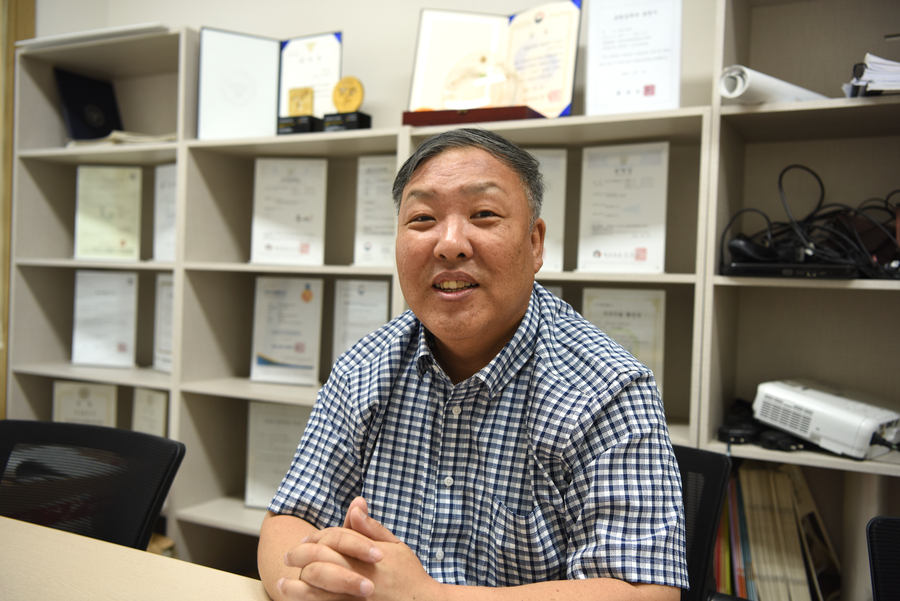
△ Kim Byung-hyuk, Executive Director of Hongseong Pulmu Co., Ltd., explains the company’s frozen rice cakes. (Photo: Nenia)
Hongseong Pulmu was incorporated in 2007, and in its early years, it struggled due to a lack of technology and distribution channels. A turning point came in 2009, when the company began supplying products to Nenia, allowing its rice cakes to enter the school meal market.
In 2010, Hongseong Pulmu won the Grand Prize at the National Eco-friendly Processed Food Contest. The company reached a new stage of stability in 2014, when it was selected as the official rice cake supplier for Pope Francis’s visit to Korea, providing rice cake lunch boxes for the event. This significantly boosted the company’s reputation, leading to a surge in orders.
Hongseong Pulmu has continued to innovate. It developed and patented the world’s only rice cake products specifically designed for frying, including items such as Crispy Rice Cake Sticks, Potato and Rice Sticks, Tteok Nuggets, and more. The company has also developed and patented rice dumplings, further diversifying its product line.
In 2020, Hongseong Pulmu completed the construction of its second factory, a facility measuring 600 pyeong. In 2022, its Kkot Sotteok (flower-shaped rice cake skewers) was selected as one of the Top 10 Processed Rice Products by the Ministry of Agriculture, Food and Rural Affairs. Today, Hongseong Pulmu supplies rice cakes to consumer cooperatives, major online platforms such as Coupang and Oasis, as well as school meal programs, institutional catering services, franchise companies, and distribution firms. Among its clients are companies that export Hongseong Pulmu rice cakes to the United States, France, Japan, China, and other countries.
Frozen Rice Cakes That Taste Better Than Freshly Made? Executive Director Kim Byung-hyuk explained: “Hongseong Pulmu’s rice cakes are the result of a combination of moisture-ratio mixing technology for the dough, equipment capable of rapid freezing at –60°C, and several other specialized processes.”
This technology adds chewiness and a refreshing coolness to the moist texture of freshly steamed rice cakes. Although they are frozen, the rice cakes can be eaten immediately after thawing, which has drawn attention in the Home Meal Replacement (HMR) market.
Of course, taste is subjective and varies from person to person, so saying they are “more delicious” is ultimately a matter of individual preference.
Kim added, “We are fully committed to enhancing quality through Individual Quick Freezing (IQF) technology, conducting technical research, and developing new products, including obtaining patents for our fried rice cakes and rice-based dumplings.”
Nenia’s Rice Cakes
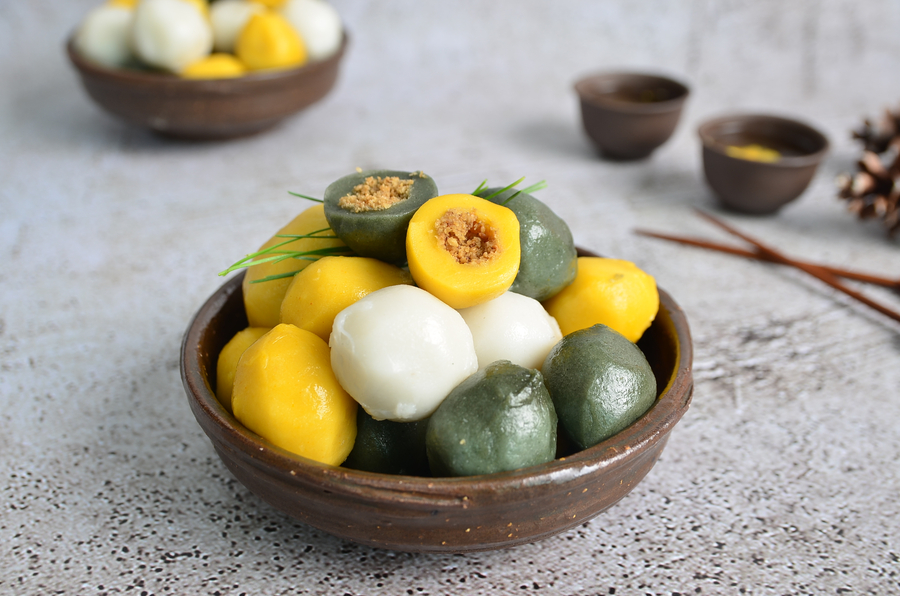
△ Nenia’s Pesticide-Free Rice Three-Color Songpyeon, produced by Hongseong Pulmu
The Nenia rice cakes produced by Hongseong Pulmu are made using pesticide-free or organic rice as standard. Among Nenia’s rice cake products, the Chuseok Songpyeon (half-moon rice cakes) are especially popular.
Key products include: Our Rice Ramie Leaf Songpyeon, made with organic rice; Sun and Moon Sweet Songpyeon, also made with organic rice; Pesticide-Free Rice Three-Color Songpyeon, made with pesticide-free rice; The Ramie Leaf Songpyeon is individually packaged, while the Sun and Moon Sweet Songpyeon is packaged in sets of two, making them convenient to enjoy.
Products such as Flower Sotteok with Nenia’s Natural Sausages (Organic Rice), Mugwort Ojaengi Rice Cake made with Glutinous Rice (Pesticide-Free Rice), Narirang Dallaerang (Organic Rice), Brown Rice Honey Rice Cake (Organic Rice), Our Rice Stick (Pesticide-Free Rice), and Our Rice Potato Rice Stick (Pesticide-Free Rice) are consistently popular throughout the year among both school cafeterias and general consumers.
Narirang Dallaerang is a bite-sized honey rice cake that features yellow and pink hues, achieved by using domestic pumpkin powder and domestic cockscomb (baekryeoncho) powder, and is sweetened with organic sugar.
During the Dan-O season in May, the seasonal limited-edition Surichi Honey Rice Cakes and Surichi Sweet Bean Garaetteok, made with domestic surichi (mountain herb) and pesticide-free rice, are so popular that demand consistently exceeds supply.
Epilogue
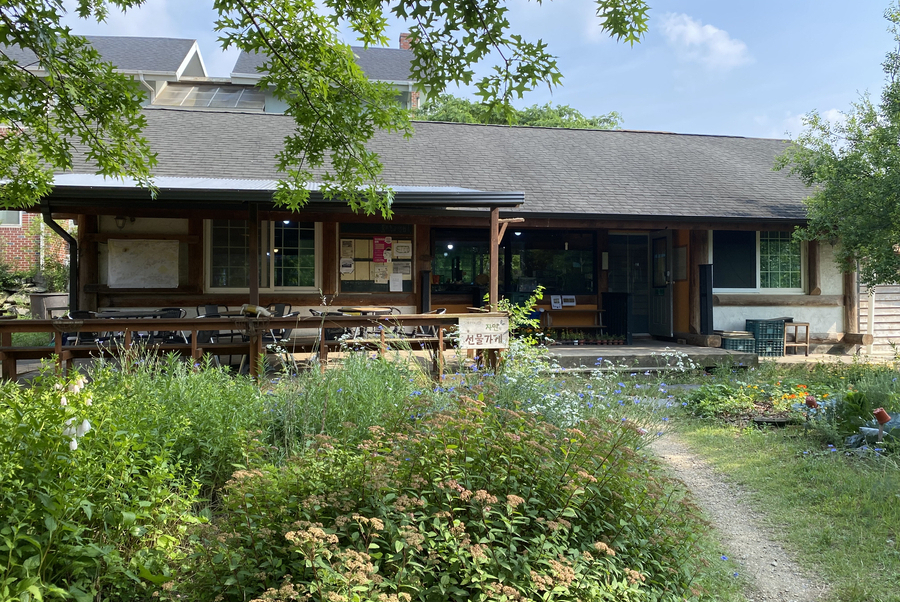
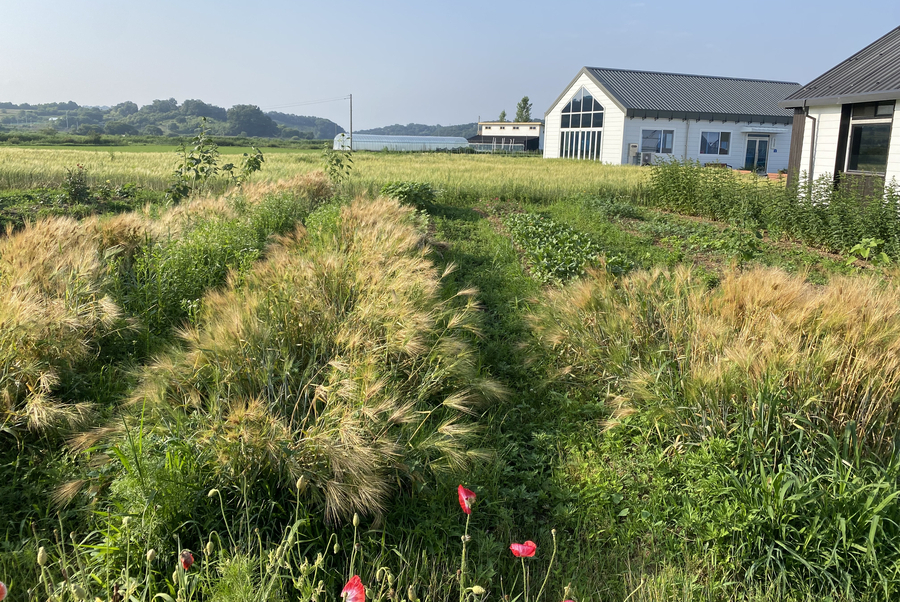
△ The area around the Onui Center in Janggok-myeon, adjacent to Hongdong-myeon. New initiatives are underway here, including agricultural education, hands-on farming experiences, and infrastructure development by young people and newcomers returning to farming communities. (Photo: Nenia)
“There is another onion field besides this one. About 100 million won has already been invested, and including rental fees, the total cost comes to about 150 million won. To make a profit, the yield would need to be worth at least 200 million won, but even after harvesting everything, it will bring in only about 3 million won. That is a loss of 147 million won.”
Park Jong-kwon farms not for profit, but for the sake of eco-friendly agriculture. Yet the Korean market expects eco-friendly produce to have the same appearance and quality as conventional produce. Even when eco-friendly farms are devastated by pests and forced to plow under their onion fields, smaller or misshapen eco-friendly crops are often ignored by consumers.
“For meaningful production, there must be consumers who are willing to value products meaningfully. Even if we try to produce in harmony with nature and people, when we reach the market, we are treated the same as conventional produce. We end up farming while holding our frustration inside.”
Like the stunted onion sprouts, Park’s heart must have ached. And yet, he does not give up. He continues to grow eco-friendly rice, Korea’s staple crop, in the region, while Nenia uses that rice to produce rice cakes that are supplied to schools and public catering programs.
The connections between people are not formed through products alone. We should take a moment to reflect on what we can offer to support their ongoing march toward organic agriculture that sustains both food and the land.
Nenia takes pride in the fact that these rice cakes carry the spirit of the land and of Pulmu School. The company has deeply shared and embraced the spirit of Hongseong Pulmu, Pulmu School, and eco-friendly agriculture, walking alongside Hongseong Pulmu for many years.
Nenia Web Magazine Editorial Department
July 8, 2025


